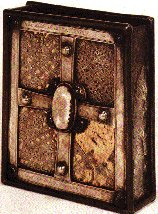Print versus Digital - the grudge match

Why A Technology Totally Supersedes An Older One
Everybody is speaking of digitized data as though it will make print obsolete and books, magazines and newspapers will wither away. I don’t believe it. In the first place, they have been predicting it since I was in library school in the mid-1980's (and before). In the second place, the technology scholar Walter Ong pointed out that most new technologies add onto the existing technologies, rather than superseding them. It is actually pretty rare for a new technology to completely make an older version obsolete.
Think of radio and television. Everybody thought that television would make radio obsolete and completely supersede it. That didn’t happen at all. People changed how they used radio. They used to focus on radio shows in groups and listen all evening. Now they listen on some portable device while they drive, run or do something else. Radio has not been superseded by television. We simply changed how we use it. It is still important to us – in some ways more important than ever.
But there are technologies that do supersede their predecessor technology and completely replace them. The example I am thinking of: the codex replacing the scroll. A codex was the forerunner of the modern book. It was basically two boards with pieces of parchment or vellum, or for schoolboys, slates, tied or sewn between. They got more sophisticated and beautiful with time. Codices replaced scrolls completely, even though scrolls carried such an aura of scholarship and learning. Why did this happen? In a codex, it was fairly easy to flip to the portion of the document you wanted to read. In a scroll, it was a tedious process to get to the bit you wanted to read, if it was in the middle or at the end of the document. So, the codex completely superseded scrolls within a few generations. We have statues of Greek and Roman scholars with buckets of scrolls, and paintings of scrolls, but nobody uses scrolls any more, except for ritual purposes. They are kept in museums.
So, what is the difference between the way television interacted with the older technology of radio and the way codices completely superseded scrolls? There are still some things that radio does better than television. Radio is better for music listening when you want to use your eyes, hands and legs for other things. It can be a good way to be introduced to new music, in fact. Radio is excellent at giving you news and weather in a way that does not expect you to use your eyes to help communicate the information. Radio sports announcers do the same when they cover baseball, or other games – I know many baseball fans in particular who prefer to listen on the radio, while they do other things. In sum, the users still found that radio retained useful characteristics – it retained a niche for itself, though modified from its former fiefdom. On the other hand, the scroll had no characteristics that were not performed better by the codex. And so, it was completely superseded as soon as the last sentimental hold-outs died off.
The question that we have to look at, as clearly as possible, is whether print media offer benefits to users that are improved or simply duplicated by electronic versions that in other ways better the print. The e-media are still evolving, so this is not a fair assessment yet. But that is the way to keep our eyes on this question. So far, I do believe the print is hanging in there. We will see as time goes along.
But what I see right now is that people are very attached to print media of all types. From paper notes, post-it notes, letters, postcards, to print-outs of the electronic research they just did. That may all change when electronic media mature and become easy to read, easier to jot down and retrieve, reliable to keep, portable.
The handsome codex decorating this essay comes from www.csun.edu/~hcarh001/496/codex.gif and appears to be a Greek Bible from the reign of Constantine circa 313 AD, but the web page is not clear about it.
No comments:
Post a Comment